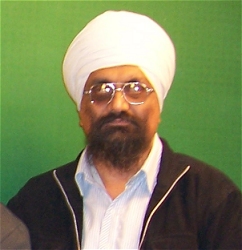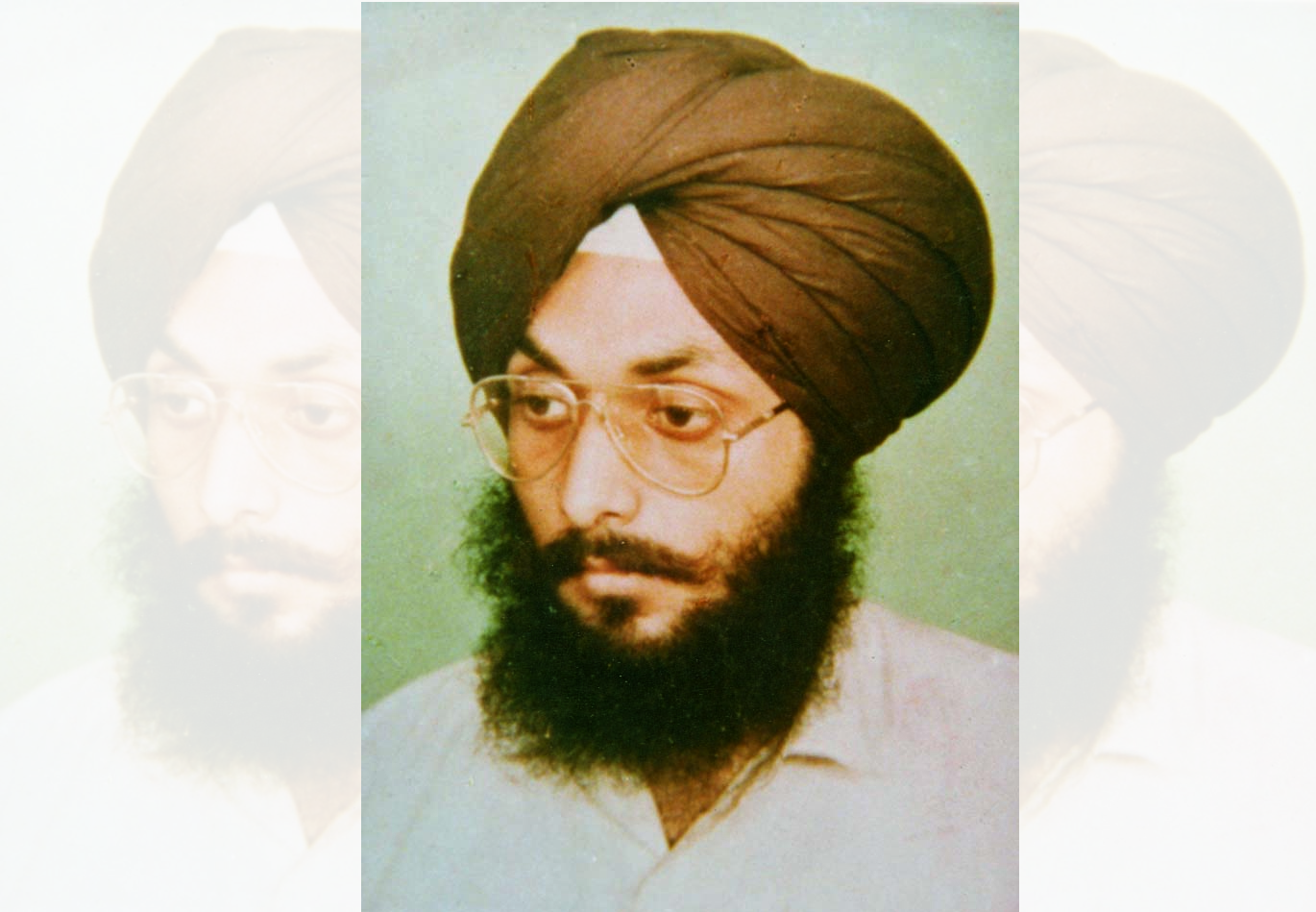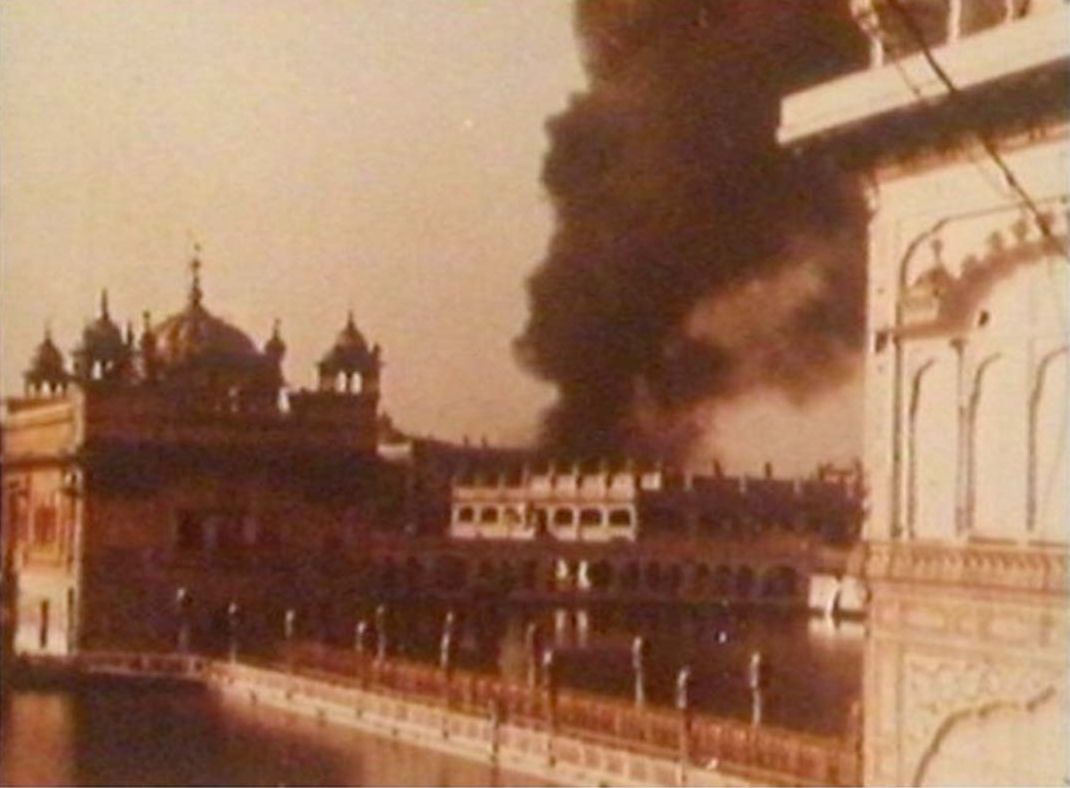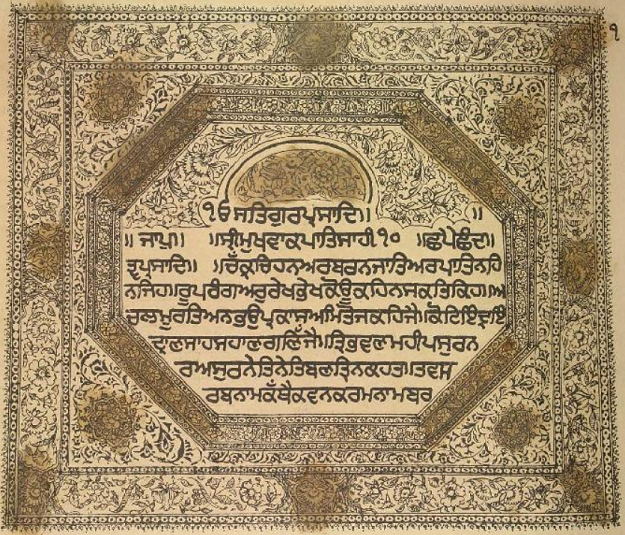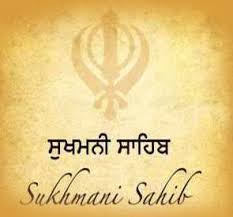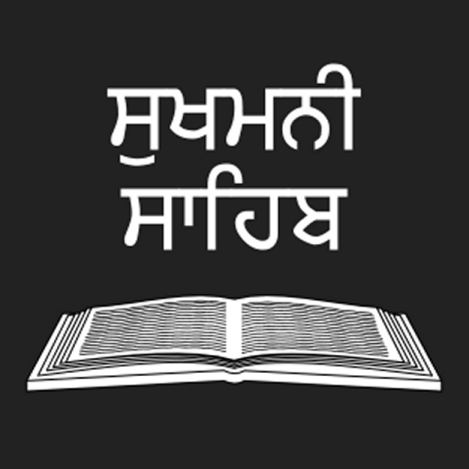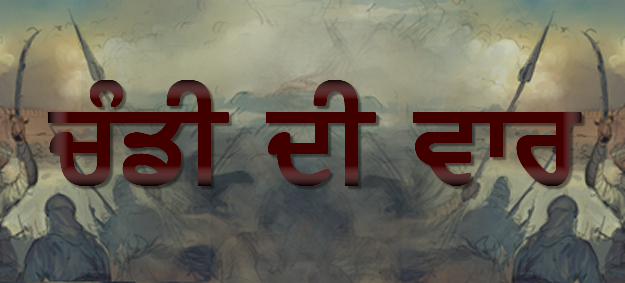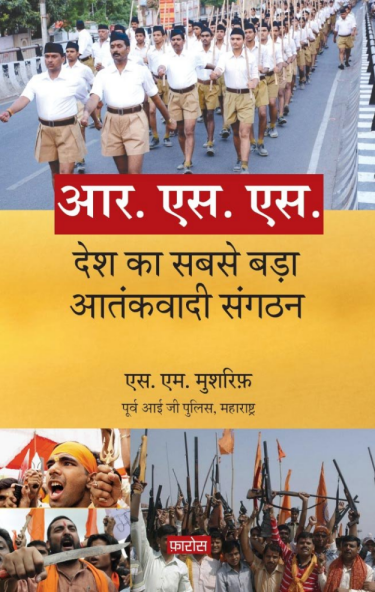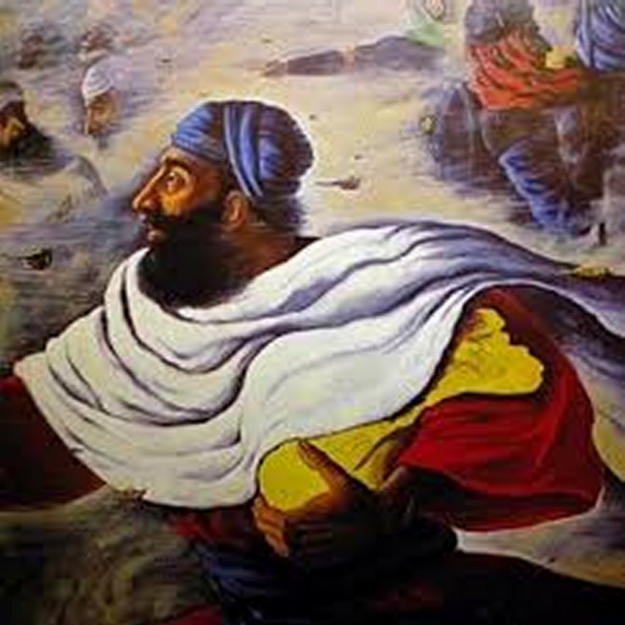
This music is struck in all Sikh temples and in all Sikh hearts every morning. It is, as it were, the sacred bequest of Guru Nanak to His disciples. All the Gurus listened to it; Guru Gobind Singh was so enamored of it, He listened to it every morning. Once when in battle with the Moghal hordes, He had left the fortress of Anandpur, and the enemy was coming after Him in hot pursuit, He made His Sikhs settle down to sing it. The enemy fell upon them during the singing of the Song; all was lost but the Song still remained. Asa-di-Var is the victor of a thousand battlesfields of death. The Song is a holy chant. Its tremendous vibration reduces time to a point and it rings in the Sikh heart like a hundred bells. Its sound scares the apparition and ghosts of darkness from the pasturelands and the Sikh spirit rises supreme and lofty, imbued with the glory of the dawn.
In Asa-di-Var, Guru Nanak is seen busy destroying the strongholds of Brahmanical superstition, with a persistent determination. And lo! He has cleared the ruins away and built on their sites a towered and thousand-pillared temple of song for all peoples and nations of the earth to gather in and worship. Guru Nanak offers to the simple folk the cup of nectar to taste. He puts a live song in the throats of those who sing it to the wild lilts of prairie and jungle, gathered in great congregations.
-Professor Puran Singh, Spirit of the Sikh
Asa Di Var of Guru Nanak
-The Guru told us, better death than a life of slavery, better death than a life of compromise with Satan.
-Again and again the Guru says, without the Guru no one obtains to life. By favor of the Guru I drop the vanity of self and its local self-hypnotizations. Meeting the Guru has extinguished the life of separation. By him man finds the Soul of the universe.
-To be indifferent for an hour, as a Sikh, is to make generations of Sikhs indifferent. How great is our responsibility to burn the lamp of the Guru, day and night, within the temple of our hearts. If the Sikh brotherhood were still inspired, no young Sikh boy could be indifferent to the rhythm of his soul.
-Without the spirit of truth burning in the heart of man, all is a lie. The king, the country, the law, the people, all are lies.
In this theme of the eternal, what is mislabeled ‘religion’ from time immemorial is cast aside. The fooly of the sacred thread is mercilessly exposed. The hypocritical readings of scriptures, the wearing of loose garments, the painting of foreheads, the reservation of cooking squares, the wrong emphasis on dietary and human secretions, and the theatricalities of devotion, are thrown away forever as unworthy of any serious notice as religion or as religious. The old impertinent rocks of all such ignorance are shattered by the Guru’s bolt and made to form the bed of His river of peace to flow through. This is Asa-di-Var which when sung, the freedom of mind is attained by imbibing the glory of truth, new with every coming sunrise.
It is for us to drink with both our palms cupped up, the peace of the Dawn that breaks for us in the hymns of Asa-di-Var.
One remembers how Bhai Nand Lal saw the face of Guru Gobind Singh and then could not find anything more beautiful. In His presence, for Bhai Nand Lal, the sun, that great orb that lights the physical universe, was dark. It was all dark without the Guru.
Once when the Guru was organizing the militia of his saint-soldiers of the Punjab, Bhai Nand Lal came and placed before the Guru a sword and a belt and begged that he too may be enlisted as the Guru’s soldier in the Guru’s armies of saints. It was a pathetic scene when the Guru went in with the sword and the belt and returned to Bhai Nand Lal with a pen, saying, "Nand Lal, you take this pen, I will wear your sword for you." And with this golden pen the poet received from Him, he wrote songs of the ineffable beauty. He, so to say, sang out his soul in shining streams of that liquid fire of love.
Asa-di-Var sings of such sensitive souls, such personal love of the great.
Asa-di-Var kindles, like the sun, the gloom of centuries. The Guru has given us great lyrics, to sing them with full voices in the wild tunes of our Majha and Malwa prairies; such is our greatest privilege of life. To let its holy sound dissolve in one's blood and into that of our children and our children’s children is a simple and spontaneous gratitude to Him, the Giver. We were in the darkness, the Guru lighted our homes with lamps of joy. The Guru made us Vihangams, eagles; he gave us wings. The Guru truly freed us in His love of us.
If we live now without the great majestic spirit of freedom, He gave us, we are wretched with all our wealth and our political doctrines. The Guru told us, better death than a life of slavery, better death than a life of compromise with Satan. The Gurus gave up their lives and the lives of their children of their disciples and through the truth they came to free man. The greatest of men make compromises with the truth to spread it amongst the people; that manipulated truth they shattered into a million atoms like a ball of snow, of a strange divine efflorescence, only to state that the freedom of the human soul was above all things. All must go, and the human soul must find its freedom.
God’s message can well go back to Heaven and return, but there shall be no compromise made with falsehood on matters of the absolute freedom of the human soul.
In this song-gift, the Guru has poured in the great power that brings freedom. Slaves sang it, they became free. One can sing it now and be free. If one are not free yet listening to it has not yet truly known this song. Perhaps a contrived theological or intellectual interpretation has been made of the Guru’s hymns, perhaps a too Brahmanical ecclesiastical turn given to the hymns of freedom; all such things of inertia and old habits have tended to deaden us to the infinite freshness of Asa-di-Var.
True feelings are infectious. How does a new born Japanese child obtain the fervor of a whole nation for his national anthem? This type of fervor is imparted to every embryo in every mother’s womb; it is there that men are made or marred. To be indifferent for an hour, as a Sikh, is to make generations of Sikhs indifferent. How great is our responsibility to burn the lamp of the Guru, day and night, within the temple of our heart. If the Sikh brotherhood were still inspired, no young Sikh boy could be indifferent to the rhythm of his soul. The young minds complain of a dead theological routine, but they don’t tell us, how else they would become more fervent for the ideals of the Guru. Replace the theological dead routine by some enthusiasm of the rising youth. Young men and women! If the present generation of men has gone wrong, then go right. But pray to go right. Young people, have you ever suspected that your cry against this discipline of love imposed upon you by your seniors may be a cry of license for indolence? If the present generation of people have not grasped the significance of the hymns of the Guru, you shall rise all the more with deadly resolve to vindicate your spiritual ancestry!
You be what they have not been. Love is always spontaneous. Judge yourself how genuine love finds its way to the Beloved. Spring, as a poet says, is His letter. How much more His Hymns! The other day, a young Sikh asked me, " Of what use is repeating Japu Ji Sahib?" I had a copy of Japu Ji Sahib with me. I pressed it to my bosom and in a frenzy I replied, "If we can sleep on it as John slept on the knee of Jesus, certainly do not repeat it. But if you love the Guru, what is the way to reach Him? Lie at His feet, and like a baby cry out His hymns. Is this not the symptom of love? If you do not feel like it, you are simply defending your want of passion, and passionate loyalty to the person of your Liberator!"
Now to the Asa-di-Var. The Guru transmutes His Sikh, makes a man into an angel. This transmutation of the metal of man is at the basis of this great inspiration to which nominally and possibly merely out of social convention we now belong. Truly, only the inspired ones belong to it, whatever their name or color or creed. No spiritual outlook comes to the blinded man till in the firmament of his soul rises the Guru-Sun to dispel the gloom. All is dark without Him. It is just like Dante’s picture of Paradise, without Beatrice, all is dark. If Beatrice is not seen by him in the shining comets, he finds his soul is being destroyed. Heaven shines if she shines. This is the secret of Dhyanam of Him. When one does not feel in glowing passion for Him, know then to be drifting away from God to Satan. One's soul-consciousness is being petrified like Ahalya of the Ramayana, or like that heroine of Gul-i-Bakaoli.
The curse is upon that one of becoming stolid, sordid, stone dead. The beautiful love-mood is gone and one, being as clever as imagination has it, the Guru states, such a being is like the empty sesame crop that is left in the fields unharvested. Its core is fungus-eaten and all its inside is rust- black rust.
Creation is viewed by Guru Nanak as His handicraft. There is the divine, beautiful, cosmic spirit of the universe, the soul, that creates out of itself, investing all His creation with the mystery of that Great Oneness of self, mystery of Beauty, out of which is born Love which personalizes the cosmic spirit of the universe. He creates love by His glances on His own handicraft.
Guru Nanak then says, "This here is truth. Whatever thou seest is He, is Truth. Forms are real. The continents are real. The swinging cosmos is Truth. His court is of Truth, His law is Truth."
All this and all that, the naked things are wondrous. All things are made of wonder, they excite wonder.
"The sky arches," says Guru Nanak, "in awe of Him, the law, the Truth." He alone is above all laws. It is by His favor that one meets the Guru. The Guru awakens the universal life in us and one realizes Truth, one forgoes self and ‘the Universe grows I.’ This realization comes by meeting the Guru.
Again and again the Guru says, without the Guru, no one gets to The life. By favor of the Guru, one drops the vanity of self and its local self-hypnotizations. Meeting the Guru has extinguished the life of separation. By him man finds the soul of the universe. This one thing is needed. Without it, all scholarship is vain, in vain the reading of cartloads of books. Education is then but a sickness, pilgrimage is a weariness of the flesh. Fasting is an unnecessary privation of the flesh. In pious vows of silence man sinks down into morbid stupors and how can, the Guru says, without the Guru, one’s soul wake up to the essential virtues? Without that awakening the blinded man, says the Guru, loses his soul for nothing. When he meets the Guru, he gets the spiritual attitude which is peace.
Without the spirit of truth burning in the heart of man, all is a lie. The king, the country, the law, the people, all are lies. These bodies, the striving raiment of youth will be left on this shore; we have to go to the shore yonder. One has ruled over the others but the path beyond is narrow so that when one is face to face with one's own self there, repents having done so many acts against the purity of one's own soul.
Then the Guru announces that forgiveness is the great act of the true spiritual attitude. His sacred thread with which man is to be twice-born, reborn of spirit, is made of Daya-forgiveness. Guru Nanak’s ethics are founded on the effects of men and impact on one’s own self-consciousness. Hatred wounds the soul. All evil causes deep fissures which take centuries to heal. For one’s own sake, one has to be good at the bayonet’s point. Though not today, tomorrow he must. Purity is the natural state of being, like the crystal stream just born in the mountains. And it is not they that wash clean or dress clean but the pure of the spirit that are truly pure. Slander no one, never indulge in reducing others on your own eyes. Only understand and pass on.
That mineral kind of purity as of the diamond and the sun to which the Yogis and the Brahmins aspire is lifeless compared with the Guru’s love and the living impulse of the spirit of comradeship the Guru planted thick in His goodness. They, the Brahmanical ascetics, had denounced woman to transcend sex. The Guru transcends sex through sex. Woman, says the Guru, is the center of life here on earth and in Heaven. Man is born of woman, He is wedded to woman. How can woman go out of the spiritual court, who gives birth to all the spiritual geniuses of the world? All are so constituted in sex. Only that Great Unborn Cosmic Spirit is above sex. Talking slander as they do of woman is to slander one’s soul. They who speak ill make only themselves ill. The dirt that sticks to one’s soul is not washed by bathing in a thousand sacred rivers. The good ones do not emphasize the outer wear. If the soul is rich, the body may be howsoever poor, what is it they wreck?
What is that gift which we earn by our own efforts. Accomplishments cannot be in the nature of spiritual gifts, these are achievements. What is truly miraculous is the gathering of those harvests which we have never sown. All others take refuge in their own Karma and are proud of what they have become thereby, good or bad. The Guru imparts faith. There is a higher universe with which we are knitted. And not by our own Karma, but my His Karma. The miraculous is to strike friendship with the Higher Ones of Heaven, not with ourselves. The miraculous is to get love from loving them. Additionally, loving, according to the Guru, is only the unfulfilled half, the fulfilled whole is being loved.
The Guru’s sayings cannot be exhausted by any amount of interpretations. A million new and varied interpretations leave them as fresh as ever. They are truly creations of art and any one of us can look at them and have his heart-cup full of meaning and direction and love and miracle and whatever he may desire.
Speaking of the Asa-di-Var, is indicating the wealth having been blessed with yet knowing not its depths.


